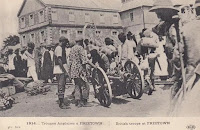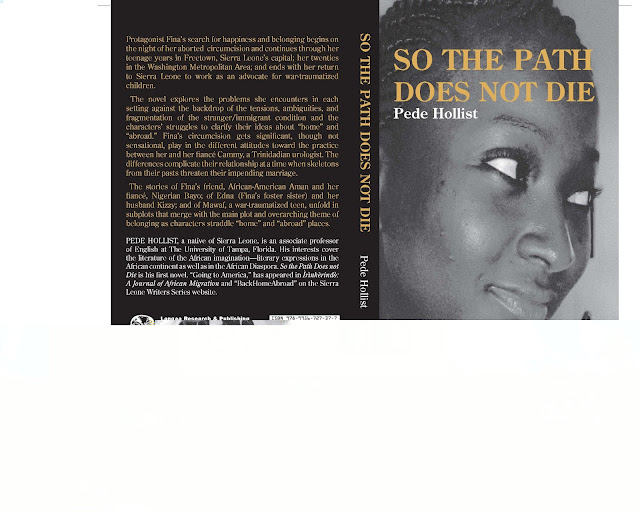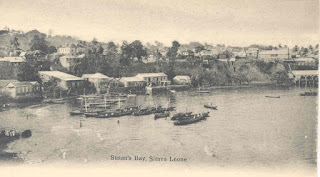Vitabu Reads | Women in Wartime Sierra Leone: Redemption Song, A Novel, Youthful Yearnings, and Dilemma of Freedom

This review is a wrap-up of three books published by Sierra Leonean Writers Series and features "the variety of experiences women (and girls) underwent" in Sierra Leone's civil war.
Sierra Leone's war began on March 23, 1991, when the Revolutionary United Front, with support from the forces of Charles Taylor's National Patriotic Front of Liberia, invaded Sierra Leone. The war lasted more than eleven years.
The women and girls we meet in Redemption Song, Yema Lucilda Hunter's fictional account of Sierra Leone's war, and Youthful Yearnings, the first novel by Jedidah Johnson, a medical student at the College of Medicine, University of Sierra Leone, reflect the attitudes, ideas, and the social paradigms that shape Sierra Leonean women.
Dilemma of Freedom: A Diary from Behind Rebel Lines in Sierra Leone's Civil War, chronicles the real-life experiences of Bailah Leigh, a specialist obstetrician and gynecologist with a focus on maternal and child healthcare, behind rebel lines during Sierra Leone's civil war.
Leigh's diary, which spans a period of more than 800 turbulent days, served as my "companion reader" for the two works of fiction by Hunter and Johnson.
On Ash Wednesday, 1993, Millicent Martin wondered why her 14-year-old son, Emmanuel, known as Manny, had wiped away the cross from his forehead, now covered with a rash of pimples.
Millicent was saddened not so much by Manny's act of rebellion but by the news of fighting at the border a few hundred miles away.
Little Florrie had been dead six years when we met the Martin family in fictional George Town, which lay six miles to the east of the capital, Sewa City. Meanwhile, rolling blackouts had continued across the city, while Millicent taught school and prepared peppered fish in the evenings for sale at Millie's Corner, a small café owned by Millicent and her husband Ola Martin.
A few weeks earlier, Millicent had sent their neighbor, Gramma Cobola, who lived at No. 4 Macauley Street, George Town's main road, a plate of black-eyed beans cooked in red palm oil and served with fried plantains, to mark the anniversary of Florrie's death.
Gramma Cobola's fleshy arms hung "like a thick fold of tripe when she raised her arm to fix her head tie." She didn't get about much because of her arthritis, but she was abundantly generous with the fruit from the orange tree in her backyard and sold some in the local market.
At an AIDS talk given at Manny's school by a public health official, a Sinhalese teacher, Mr. Senevaratne, wanted to know whether mosquitoes could spread HIV.
Manny's friends were Chico, Solade, and Khalid, his best friend. He loved Hamida, Khalid's sister because she didn't notice his pimples.
Another neighbor was Mr. Danso's sister, who saw that Mr. Danso had on a clean shirt and pair of trousers with neatly combed hair each day, as her brother recovered from a mental breakdown while studying abroad.
There was also Belinda Adams. Manny's crush for a while, until Belinda turned sixteen and jilted him at her birthday party for a 30-year-old guy with a gold signet ring and a medallion on his hairy chest.
Melvina, Manny's half-sister, who was born after Millicent refused to have any relations with Ola after little Florrie died, never quite makes a full entrance before her mother emigrates.
By then the war had dragged on for three years.
We re-meet arms trade and war profiteer Pablo Malick as he shows off his fourth trophy wife, "a tall biscuit-colored" Fula, who made couscous and chicken stew.
The morning after the sumptuous dinner, warlord Kelli Kanekeh gets an epiphany on how to win the war for his paymasters as he is "standing over the lavatory bowl urinating copiously."
It's during one of his terror raids with guerillas no older than twenty-five, that we meet the family who fought for the rainforest.
As the rebels storm the little houses in the forest, Mawa loses control of her bowels. She and her brother Samu are abducted by other village kids. For two nights, the children are frog-marched with mouths stuffed with rags, wrists tied together, and linked in a single file with ropes around their necks. Mawa is raped by a rebel commander, becomes his sex slave, and Samu's forehead gets branded with a hot rod by Mawa's rapist.
Kanekeh's woman appears like a fallen angel with a bowl filled with honey to tend the wounds. Lurking in the background are women combatants in tee shirts and jeans and "girls in the cooking detail." On the battlefield, Samu sees ‘pregnant women dying on the ground, the contents of their bellies spilled open, pitiful little corpses curled up beside them still attached to their umbilical cords.'
Back in George Town, Hamida has blossomed with a slender neck like a seagull. Her skin is as shiny and smooth as an eggplant. Plus, Hamida has agreed to be Manny's girl.
Mawa's now pregnant.
Trying ‘to hide the bulge that is changing the shape of her body, she avoids her brother altogether, averts her eyes whenever she sees him coming and scurries away like a rat.' When she dies in labor, her "bush husband" tells Samu, "Come take way your sister, she's died in my room."
As fate would have it, when Samu finally gets to George Town, he invades the Martin's home, riddles Ola with bullets and guns down Millicent, who screams ‘Run Manny, run!" before she dies.
It's now 1997. Mrs. Binda, a ‘tough-talking no-nonsense woman in charge of the food camp helps Manny come to terms with his grief. But not before an encounter with Samu, who returns to the forest and succeeds in freeing abducted girls from George Town.
Among them is Hamida. Manny's girl.
 When the war hits Kalaba village in 1997, Ribsey, the girl in the blue dress, dies during the first wave of attacks. Her body won't be buried for three days.
When the war hits Kalaba village in 1997, Ribsey, the girl in the blue dress, dies during the first wave of attacks. Her body won't be buried for three days.
Mama, the mother of Ribsey's older brothers---Pat, the eldest, Kunt, the middle son, and Alhaji, the youngest---has lost her husband and the children's father a few months earlier. Her late husband's brothers think that she must be married off to one of them, but not before she consents to rape by a renegade soldier as a bounty for the lives of her sons.
Soon, orphaned Claire Peters meets the family in Kalaba. Claire has seen domestic violence, parents at war, been threatened with abuse and survived abandonment. Captain Never Die kills Pat in a vengeful act in the town square and Alhaji gives himself up to the rebels to save Claire.
Branded like livestock just as Samu was in Redemption Song, Alhaji rapes and murders like a killer robot. Seven years later when Claire returns to claim him, the ‘Find Alhaji hotline' is flooded with sightings of Alhaji ‘You shouldn't have come looking for me,' he said.
In this autobiography, Bailah Leigh is facing trial at the High Court in 1998. He has been indicted on several counts of treason, the second accused out of 21 people. November 4, 1998, marks day 100 of their trial and only Mariama, Leigh's wife, is able to enter the overcrowded courtroom on the day the verdict is read out. Twenty-one years earlier, Dr. Leigh had returned home from Germany, where he studied medicine and specialized in the field of obstetrics and gynecology to serve Sierra Leone.
The notorious prison, where we first meet the fictional Kelli Kanekeh and Pablc Malick in Redemption: A Novel, doesn't hold Dr. Leigh for long, but he doesn't escape the vortex of violence either.
On Wednesday, January 6, 1999, there was a jailbreak at Pademba Road prisons and Leigh with more than 5,800 prisoners and detainees, including over 3,400 soldiers urged to leave by soldiers from the Revolutionary United Front (RUF), the rebel army that fought Sierra Leone Army soldiers in the eleven-year war in Sierra Leone, starting in 1991 and ending in 2002.
More than 200 days later, Leigh is reunited with his wife, Mariama, and their children Adama, Fatmata, and Alimamy.
Millicent was saddened not so much by Manny's act of rebellion but by the news of fighting at the border a few hundred miles away.
Little Florrie had been dead six years when we met the Martin family in fictional George Town, which lay six miles to the east of the capital, Sewa City. Meanwhile, rolling blackouts had continued across the city, while Millicent taught school and prepared peppered fish in the evenings for sale at Millie's Corner, a small café owned by Millicent and her husband Ola Martin.
A few weeks earlier, Millicent had sent their neighbor, Gramma Cobola, who lived at No. 4 Macauley Street, George Town's main road, a plate of black-eyed beans cooked in red palm oil and served with fried plantains, to mark the anniversary of Florrie's death.
Gramma Cobola's fleshy arms hung "like a thick fold of tripe when she raised her arm to fix her head tie." She didn't get about much because of her arthritis, but she was abundantly generous with the fruit from the orange tree in her backyard and sold some in the local market.
At an AIDS talk given at Manny's school by a public health official, a Sinhalese teacher, Mr. Senevaratne, wanted to know whether mosquitoes could spread HIV.
Manny's friends were Chico, Solade, and Khalid, his best friend. He loved Hamida, Khalid's sister because she didn't notice his pimples.
Another neighbor was Mr. Danso's sister, who saw that Mr. Danso had on a clean shirt and pair of trousers with neatly combed hair each day, as her brother recovered from a mental breakdown while studying abroad.
There was also Belinda Adams. Manny's crush for a while, until Belinda turned sixteen and jilted him at her birthday party for a 30-year-old guy with a gold signet ring and a medallion on his hairy chest.
Melvina, Manny's half-sister, who was born after Millicent refused to have any relations with Ola after little Florrie died, never quite makes a full entrance before her mother emigrates.
By then the war had dragged on for three years.
We re-meet arms trade and war profiteer Pablo Malick as he shows off his fourth trophy wife, "a tall biscuit-colored" Fula, who made couscous and chicken stew.
The morning after the sumptuous dinner, warlord Kelli Kanekeh gets an epiphany on how to win the war for his paymasters as he is "standing over the lavatory bowl urinating copiously."
It's during one of his terror raids with guerillas no older than twenty-five, that we meet the family who fought for the rainforest.
As the rebels storm the little houses in the forest, Mawa loses control of her bowels. She and her brother Samu are abducted by other village kids. For two nights, the children are frog-marched with mouths stuffed with rags, wrists tied together, and linked in a single file with ropes around their necks. Mawa is raped by a rebel commander, becomes his sex slave, and Samu's forehead gets branded with a hot rod by Mawa's rapist.
Kanekeh's woman appears like a fallen angel with a bowl filled with honey to tend the wounds. Lurking in the background are women combatants in tee shirts and jeans and "girls in the cooking detail." On the battlefield, Samu sees ‘pregnant women dying on the ground, the contents of their bellies spilled open, pitiful little corpses curled up beside them still attached to their umbilical cords.'
Back in George Town, Hamida has blossomed with a slender neck like a seagull. Her skin is as shiny and smooth as an eggplant. Plus, Hamida has agreed to be Manny's girl.
Mawa's now pregnant.
Trying ‘to hide the bulge that is changing the shape of her body, she avoids her brother altogether, averts her eyes whenever she sees him coming and scurries away like a rat.' When she dies in labor, her "bush husband" tells Samu, "Come take way your sister, she's died in my room."
As fate would have it, when Samu finally gets to George Town, he invades the Martin's home, riddles Ola with bullets and guns down Millicent, who screams ‘Run Manny, run!" before she dies.
It's now 1997. Mrs. Binda, a ‘tough-talking no-nonsense woman in charge of the food camp helps Manny come to terms with his grief. But not before an encounter with Samu, who returns to the forest and succeeds in freeing abducted girls from George Town.
Among them is Hamida. Manny's girl.
Youthful Yearnings
 When the war hits Kalaba village in 1997, Ribsey, the girl in the blue dress, dies during the first wave of attacks. Her body won't be buried for three days.
When the war hits Kalaba village in 1997, Ribsey, the girl in the blue dress, dies during the first wave of attacks. Her body won't be buried for three days. Mama, the mother of Ribsey's older brothers---Pat, the eldest, Kunt, the middle son, and Alhaji, the youngest---has lost her husband and the children's father a few months earlier. Her late husband's brothers think that she must be married off to one of them, but not before she consents to rape by a renegade soldier as a bounty for the lives of her sons.
Soon, orphaned Claire Peters meets the family in Kalaba. Claire has seen domestic violence, parents at war, been threatened with abuse and survived abandonment. Captain Never Die kills Pat in a vengeful act in the town square and Alhaji gives himself up to the rebels to save Claire.
Branded like livestock just as Samu was in Redemption Song, Alhaji rapes and murders like a killer robot. Seven years later when Claire returns to claim him, the ‘Find Alhaji hotline' is flooded with sightings of Alhaji ‘You shouldn't have come looking for me,' he said.
Dilemma of Freedom: A diary from behind rebel lines in Sierra Leone's Civil War
In this autobiography, Bailah Leigh is facing trial at the High Court in 1998. He has been indicted on several counts of treason, the second accused out of 21 people. November 4, 1998, marks day 100 of their trial and only Mariama, Leigh's wife, is able to enter the overcrowded courtroom on the day the verdict is read out. Twenty-one years earlier, Dr. Leigh had returned home from Germany, where he studied medicine and specialized in the field of obstetrics and gynecology to serve Sierra Leone.
The notorious prison, where we first meet the fictional Kelli Kanekeh and Pablc Malick in Redemption: A Novel, doesn't hold Dr. Leigh for long, but he doesn't escape the vortex of violence either.
On Wednesday, January 6, 1999, there was a jailbreak at Pademba Road prisons and Leigh with more than 5,800 prisoners and detainees, including over 3,400 soldiers urged to leave by soldiers from the Revolutionary United Front (RUF), the rebel army that fought Sierra Leone Army soldiers in the eleven-year war in Sierra Leone, starting in 1991 and ending in 2002.
More than 200 days later, Leigh is reunited with his wife, Mariama, and their children Adama, Fatmata, and Alimamy.




Comments
Post a Comment